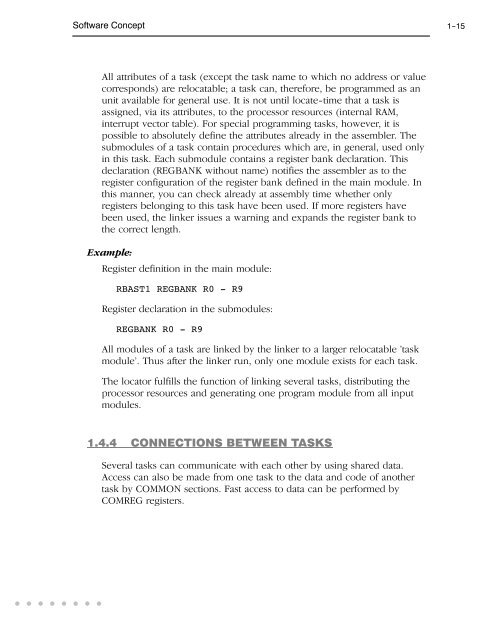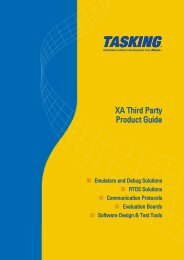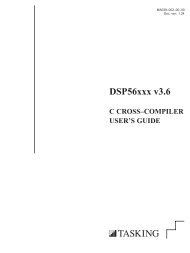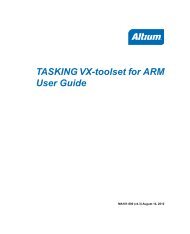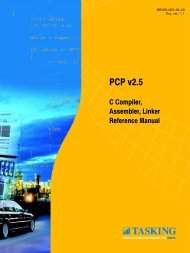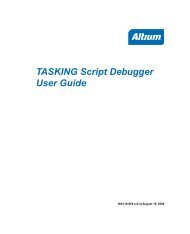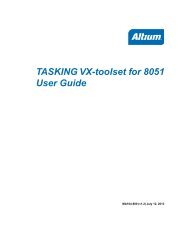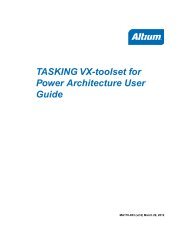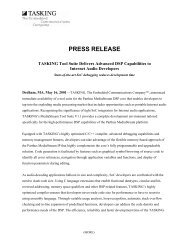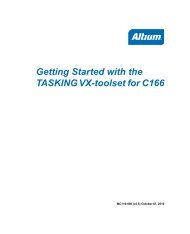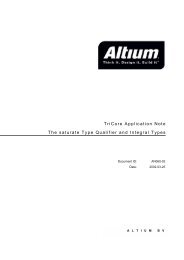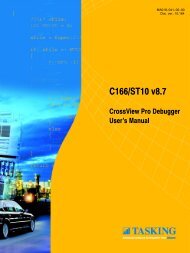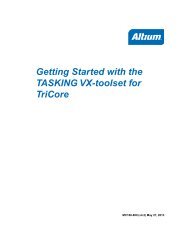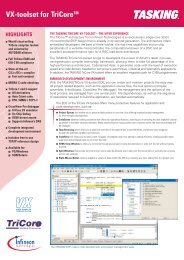- Page 1 and 2: C166/ST10 v8.7 MA019−000−00−0
- Page 3 and 4: The information in this document ha
- Page 5 and 6: IV CONTENTS CONTENTS Table of Conte
- Page 7 and 8: VI CONTENTS Table of Contents 1.7.4
- Page 9 and 10: VIII CONTENTS Table of Contents 2.7
- Page 11 and 12: X CONTENTS Table of Contents ASSEMB
- Page 13 and 14: XII CONTENTS Table of Contents 10.6
- Page 15 and 16: XIV CONTENTS Table of Contents LINK
- Page 17 and 18: XVI MANUAL STRUCTURE Manual Purpose
- Page 19 and 20: XVIII MANUAL STRUCTURE RELATED PUBL
- Page 21 and 22: XX MANUAL STRUCTURE Manual Purpose
- Page 23 and 24: 1−2 CONCEPT CHAPTER 1 Chapter 1
- Page 25 and 26: 1−4 CONCEPT Chapter 1 Ease of Deb
- Page 27 and 28: 1−6 CONCEPT Chapter 1 Classes Com
- Page 29 and 30: 1−8 CONCEPT In support of the pro
- Page 31 and 32: 1−10 CONCEPT 1.3 INTERRUPT CONCEP
- Page 33 and 34: 1−12 CONCEPT 1.4.2 SOFTWARE SUPPO
- Page 35: 1−14 CONCEPT Example: TSKPROC PRO
- Page 39 and 40: 1−18 CONCEPT 1.4.4.2 COMMON SECTI
- Page 41 and 42: 1−20 CONCEPT 1.5 THE FLAT INTERRU
- Page 43 and 44: 1−22 CONCEPT The Flat Interrupt c
- Page 45 and 46: 1−24 CONCEPT 1.6.1.1 ATTRIBUTES O
- Page 47 and 48: 1−26 CONCEPT 1.6.3 THE TERM ’CL
- Page 49 and 50: 1−28 CONCEPT Chapter 1 The SEGMEN
- Page 51 and 52: 1−30 CONCEPT Sections: Type Appro
- Page 53 and 54: 1−32 CONCEPT Map example III Usin
- Page 55 and 56: 1−34 CONCEPT 1.8 REGISTERS Chapte
- Page 57 and 58: 1−36 CONCEPT Chapter 1 As a resul
- Page 59 and 60: 1−38 CONCEPT 1.9 USE OF THE PEC (
- Page 61 and 62: 1−40 CONCEPT Example: Chapter 1 M
- Page 63 and 64: 1−42 CONCEPT or label: instructio
- Page 65 and 66: 1−44 CONCEPT 1.10.3 CONSTANTS Cha
- Page 67 and 68: 1−46 CONCEPT 1.11 SCOPES OF SYMBO
- Page 69 and 70: 1−48 CONCEPT Chapter 1
- Page 71 and 72: 2−2 MACRO PREPROCESSOR CHAPTER 2
- Page 73 and 74: 2−4 MACRO PREPROCESSOR Chapter 2
- Page 75 and 76: 2−6 MACRO PREPROCESSOR 2.4 M166 C
- Page 77 and 78: 2−8 MACRO PREPROCESSOR 2.4.2 DESC
- Page 79 and 80: 2−10 MACRO PREPROCESSOR DATE Cont
- Page 81 and 82: 2−12 MACRO PREPROCESSOR Chapter 2
- Page 83 and 84: 2−14 MACRO PREPROCESSOR ERRORPRIN
- Page 85 and 86: 2−16 MACRO PREPROCESSOR INCLUDE C
- Page 87 and 88:
2−18 MACRO PREPROCESSOR LINE Cont
- Page 89 and 90:
2−20 MACRO PREPROCESSOR PAGELENGT
- Page 91 and 92:
2−22 MACRO PREPROCESSOR PAGING Co
- Page 93 and 94:
2−24 MACRO PREPROCESSOR SAVE/REST
- Page 95 and 96:
2−26 MACRO PREPROCESSOR TITLE Con
- Page 97 and 98:
2−28 MACRO PREPROCESSOR 2.5 CREAT
- Page 99 and 100:
2−30 MACRO PREPROCESSOR Example:
- Page 101 and 102:
2−32 MACRO PREPROCESSOR Example 4
- Page 103 and 104:
2−34 MACRO PREPROCESSOR 2.5.2 CRE
- Page 105 and 106:
2−36 MACRO PREPROCESSOR 2.5.3 LOC
- Page 107 and 108:
2−38 MACRO PREPROCESSOR 2.6 THE M
- Page 109 and 110:
2−40 MACRO PREPROCESSOR 2.6.2 SET
- Page 111 and 112:
2−42 MACRO PREPROCESSOR 2.6.4.1 I
- Page 113 and 114:
2−44 MACRO PREPROCESSOR This expa
- Page 115 and 116:
2−46 MACRO PREPROCESSOR 2.6.4.4 B
- Page 117 and 118:
2−48 MACRO PREPROCESSOR Chapter 2
- Page 119 and 120:
2−50 MACRO PREPROCESSOR Chapter 2
- Page 121 and 122:
2−52 MACRO PREPROCESSOR Example:
- Page 123 and 124:
2−54 MACRO PREPROCESSOR Chapter 2
- Page 125 and 126:
2−56 MACRO PREPROCESSOR Example:
- Page 127 and 128:
2−58 MACRO PREPROCESSOR 2.6.10 OV
- Page 129 and 130:
2−60 MACRO PREPROCESSOR 9) The MA
- Page 131 and 132:
2−62 MACRO PREPROCESSOR 2.7.1.1 D
- Page 133 and 134:
2−64 MACRO PREPROCESSOR Example:
- Page 135 and 136:
2−66 MACRO PREPROCESSOR Chapter 2
- Page 137 and 138:
2−68 MACRO PREPROCESSOR Chapter 2
- Page 139 and 140:
2−70 MACRO PREPROCESSOR Chapter 2
- Page 141 and 142:
2−72 MACRO PREPROCESSOR Chapter 2
- Page 143 and 144:
2−74 MACRO PREPROCESSOR Chapter 2
- Page 145 and 146:
3−2 ASSEMBLER CHAPTER 3 Chapter 3
- Page 147 and 148:
3−4 ASSEMBLER Chapter 3 −f with
- Page 149 and 150:
3−6 ASSEMBLER Examples: PC: set T
- Page 151 and 152:
4−2 LANGUAGE CHAPTER 4 Chapter 4
- Page 153 and 154:
4−4 LANGUAGE 4.2 SECTIONS Chapter
- Page 155 and 156:
4−6 LANGUAGE Example: The followi
- Page 157 and 158:
4−8 LANGUAGE Software Mnemonic AD
- Page 159 and 160:
4−10 LANGUAGE 4.5 EXTENDED INSTRU
- Page 161 and 162:
4−12 LANGUAGE Chapter 4 The whole
- Page 163 and 164:
4−14 LANGUAGE 4.5.5 PAGE EXTEND A
- Page 165 and 166:
5−2 OPERANDS & EXPRESSIONS CHAPTE
- Page 167 and 168:
5−4 OPERANDS & EXPRESSIONS 5.1.1
- Page 169 and 170:
5−6 OPERANDS & EXPRESSIONS Exampl
- Page 171 and 172:
5−8 OPERANDS & EXPRESSIONS 5.1.2.
- Page 173 and 174:
5−10 OPERANDS & EXPRESSIONS 5.1.2
- Page 175 and 176:
5−12 OPERANDS & EXPRESSIONS Examp
- Page 177 and 178:
5−14 OPERANDS & EXPRESSIONS Binar
- Page 179 and 180:
5−16 OPERANDS & EXPRESSIONS 5.2.3
- Page 181 and 182:
5−18 OPERANDS & EXPRESSIONS Opera
- Page 183 and 184:
5−20 OPERANDS & EXPRESSIONS 5.3.1
- Page 185 and 186:
5−22 OPERANDS & EXPRESSIONS Examp
- Page 187 and 188:
5−24 OPERANDS & EXPRESSIONS 5.3.2
- Page 189 and 190:
5−26 OPERANDS & EXPRESSIONS 5.3.2
- Page 191 and 192:
5−28 OPERANDS & EXPRESSIONS 5.3.3
- Page 193 and 194:
5−30 OPERANDS & EXPRESSIONS Examp
- Page 195 and 196:
5−32 OPERANDS & EXPRESSIONS 5.4 S
- Page 197 and 198:
5−34 OPERANDS & EXPRESSIONS Chapt
- Page 199 and 200:
6−2 CONTROLS CHAPTER 6 Chapter 6
- Page 201 and 202:
6−4 CONTROLS 6.2 OVERVIEW A166 CO
- Page 203 and 204:
6−6 CONTROLS Control SEGMENTED NO
- Page 205 and 206:
6−8 CONTROLS Control CHECKPECCP N
- Page 207 and 208:
6−10 CONTROLS ASMLINEINFO Control
- Page 209 and 210:
6−12 CONTROLS CASE Control: From
- Page 211 and 212:
6−14 CONTROLS CHECKC166SV1DIV Con
- Page 213 and 214:
6−16 CONTROLS CHECKC166SV1DPRAM C
- Page 215 and 216:
6−18 CONTROLS CHECKC166SV1EXTSEQ
- Page 217 and 218:
6−20 CONTROLS CHECKC166SV1PHANTOM
- Page 219 and 220:
6−22 CONTROLS CHECKC166SV1SCXT Co
- Page 221 and 222:
6−24 CONTROLS CHECKCPU16 Control:
- Page 223 and 224:
6−26 CONTROLS CHECKCPU21 Control:
- Page 225 and 226:
6−28 CONTROLS CHECKCPUJMPRACACHE
- Page 227 and 228:
6−30 CONTROLS CHECKCPURETPEXT Con
- Page 229 and 230:
6−32 CONTROLS CHECKPECC Control:
- Page 231 and 232:
6−34 CONTROLS Chapter 6 Example:
- Page 233 and 234:
6−36 CONTROLS CHECKMULDIV Control
- Page 235 and 236:
6−38 CONTROLS DATE Control: Chapt
- Page 237 and 238:
6−40 CONTROLS EJECT Control: EJEC
- Page 239 and 240:
6−42 CONTROLS EXPANDREGBANK Contr
- Page 241 and 242:
6−44 CONTROLS EXTEND / EXTEND1 /
- Page 243 and 244:
6−46 CONTROLS EXTPEC16 Control: F
- Page 245 and 246:
6−48 CONTROLS Example: a166 x.src
- Page 247 and 248:
6−50 CONTROLS GSO Control: From t
- Page 249 and 250:
6−52 CONTROLS INCLUDE Control: IN
- Page 251 and 252:
6−54 CONTROLS LIST Control: Chapt
- Page 253 and 254:
6−56 CONTROLS LOCALS Control: Fro
- Page 255 and 256:
6−58 CONTROLS MOD166 Control: MOD
- Page 257 and 258:
6−60 CONTROLS OBJECT Control: Fro
- Page 259 and 260:
6−62 CONTROLS PAGELENGTH Control:
- Page 261 and 262:
6−64 CONTROLS PAGING Control: Cha
- Page 263 and 264:
6−66 CONTROLS Chapter 6 Examples:
- Page 265 and 266:
6−68 CONTROLS RETCHECK Control: F
- Page 267 and 268:
6−70 CONTROLS SAVE / RESTORE Cont
- Page 269 and 270:
6−72 CONTROLS STDNAMES Control: F
- Page 271 and 272:
6−74 CONTROLS STRICTTASK Control:
- Page 273 and 274:
6−76 CONTROLS SYMBOLS Control: Ch
- Page 275 and 276:
6−78 CONTROLS TITLE Control: Chap
- Page 277 and 278:
6−80 CONTROLS WARNING Control: Fr
- Page 279 and 280:
6−82 CONTROLS WARNINGASERROR Cont
- Page 281 and 282:
6−84 CONTROLS Chapter 6
- Page 283 and 284:
7−2 DIRECTIVES CHAPTER 7 Chapter
- Page 285 and 286:
7−4 DIRECTIVES Directive Descript
- Page 287 and 288:
7−6 DIRECTIVES ?FILE Synopsis: ?F
- Page 289 and 290:
7−8 DIRECTIVES ASSUME Synopsis: A
- Page 291 and 292:
7−10 DIRECTIVES Chapter 7 This ke
- Page 293 and 294:
7−12 DIRECTIVES Chapter 7 Example
- Page 295 and 296:
7−14 DIRECTIVES BLOCK Synopsis: n
- Page 297 and 298:
7−16 DIRECTIVES Chapter 7 A GROUP
- Page 299 and 300:
7−18 DIRECTIVES Chapter 7 DW Init
- Page 301 and 302:
7−20 DIRECTIVES DW CSEC1 ; Store
- Page 303 and 304:
7−22 DIRECTIVES Chapter 7 DBFILL/
- Page 305 and 306:
7−24 DIRECTIVES DEFR/DEFA/DEFX/DE
- Page 307 and 308:
7−26 DIRECTIVES − Bit−address
- Page 309 and 310:
7−28 DIRECTIVES Chapter 7 init DS
- Page 311 and 312:
7−30 DIRECTIVES END Synopsis: END
- Page 313 and 314:
7−32 DIRECTIVES EVEN Synopsis: EV
- Page 315 and 316:
7−34 DIRECTIVES Example: Module A
- Page 317 and 318:
7−36 DIRECTIVES GLOBAL Synopsis:
- Page 319 and 320:
7−38 DIRECTIVES LABEL Synopsis:
- Page 321 and 322:
7−40 DIRECTIVES LIT Synopsis: lit
- Page 323 and 324:
7−42 DIRECTIVES ORG Synopsis: ORG
- Page 325 and 326:
7−44 DIRECTIVES PECDEF Synopsis:
- Page 327 and 328:
7−46 DIRECTIVES Chapter 7 The C16
- Page 329 and 330:
7−48 DIRECTIVES 3. Interrupt rout
- Page 331 and 332:
7−50 DIRECTIVES Module B EXTERN A
- Page 333 and 334:
7−52 DIRECTIVES Chapter 7 If regi
- Page 335 and 336:
7−54 DIRECTIVES Chapter 7 REGDEF
- Page 337 and 338:
7−56 DIRECTIVES The three resulti
- Page 339 and 340:
7−58 DIRECTIVES SECTION/ENDS Syno
- Page 341 and 342:
7−60 DIRECTIVES Align Type Descri
- Page 343 and 344:
7−62 DIRECTIVES Combine Type Desc
- Page 345 and 346:
7−64 DIRECTIVES SSKDEF Synopsis:
- Page 347 and 348:
7−66 DIRECTIVES Example: TYPEDEC
- Page 349 and 350:
8−2 DERIVATIVES CHAPTER 8 Chapter
- Page 351 and 352:
8−4 DERIVATIVES Chapter 8 Instruc
- Page 353 and 354:
8−6 DERIVATIVES Chapter 8 Because
- Page 355 and 356:
9−2 LINKER/LOCATOR CHAPTER 9 Chap
- Page 357 and 358:
9−4 LINKER/LOCATOR 9.2.1 LINKER/L
- Page 359 and 360:
9−6 LINKER/LOCATOR 9.4 LOCATE ALG
- Page 361 and 362:
9−8 LINKER/LOCATOR Chapter 9 Line
- Page 363 and 364:
9−10 LINKER/LOCATOR 9.5 INVOCATIO
- Page 365 and 366:
9−12 LINKER/LOCATOR Chapter 9 Sin
- Page 367 and 368:
9−14 LINKER/LOCATOR Chapter 9 If
- Page 369 and 370:
9−16 LINKER/LOCATOR Examples: PC:
- Page 371 and 372:
9−18 LINKER/LOCATOR 9.8 DEFAULT O
- Page 373 and 374:
9−20 LINKER/LOCATOR Chapter 9 Inv
- Page 375 and 376:
9−22 LINKER/LOCATOR Chapter 9 Cla
- Page 377 and 378:
9−24 LINKER/LOCATOR 9.11 L166 CON
- Page 379 and 380:
9−26 LINKER/LOCATOR Example of an
- Page 381 and 382:
9−28 LINKER/LOCATOR Chapter 9 RAN
- Page 383 and 384:
9−30 LINKER/LOCATOR Chapter 9 Sec
- Page 385 and 386:
9−32 LINKER/LOCATOR 9.11.4 OVERVI
- Page 387 and 388:
9−34 LINKER/LOCATOR Control SECSI
- Page 389 and 390:
9−36 LINKER/LOCATOR Control (Loca
- Page 391 and 392:
9−38 LINKER/LOCATOR 9.11.5 DESCRI
- Page 393 and 394:
9−40 LINKER/LOCATOR Chapter 9 Wit
- Page 395 and 396:
9−42 LINKER/LOCATOR Example: l166
- Page 397 and 398:
9−44 LINKER/LOCATOR CHECKCLASSES
- Page 399 and 400:
9−46 LINKER/LOCATOR CHECKGLOBALS
- Page 401 and 402:
9−48 LINKER/LOCATOR CLASSES Contr
- Page 403 and 404:
9−50 LINKER/LOCATOR CODEINROM Con
- Page 405 and 406:
9−52 LINKER/LOCATOR DATE Control:
- Page 407 and 408:
9−54 LINKER/LOCATOR EXTEND2 Contr
- Page 409 and 410:
9−56 LINKER/LOCATOR FIXSTBUS1 Con
- Page 411 and 412:
9−58 LINKER/LOCATOR GENERAL Contr
- Page 413 and 414:
9−60 LINKER/LOCATOR GLOBALSONLY C
- Page 415 and 416:
9−62 LINKER/LOCATOR HEAPSIZE Cont
- Page 417 and 418:
9−64 LINKER/LOCATOR INTERRUPT Con
- Page 419 and 420:
9−66 LINKER/LOCATOR IRAMSIZE Cont
- Page 421 and 422:
9−68 LINKER/LOCATOR LINES Control
- Page 423 and 424:
9−70 LINKER/LOCATOR LISTREGISTERS
- Page 425 and 426:
9−72 LINKER/LOCATOR LOCALS Contro
- Page 427 and 428:
9−74 LINKER/LOCATOR MEMORY Contro
- Page 429 and 430:
9−76 LINKER/LOCATOR Chapter 9 Whe
- Page 431 and 432:
9−78 LINKER/LOCATOR MISRAC Contro
- Page 433 and 434:
9−80 LINKER/LOCATOR MODPATH Contr
- Page 435 and 436:
9−82 LINKER/LOCATOR NAME Control:
- Page 437 and 438:
9−84 LINKER/LOCATOR ORDER Control
- Page 439 and 440:
9−86 LINKER/LOCATOR The resulting
- Page 441 and 442:
9−88 LINKER/LOCATOR OVERLAY Contr
- Page 443 and 444:
9−90 LINKER/LOCATOR RESERVE MEMOR
- Page 445 and 446:
9−92 LINKER/LOCATOR PAGEWIDTH Con
- Page 447 and 448:
9−94 LINKER/LOCATOR PRINT Control
- Page 449 and 450:
9−96 LINKER/LOCATOR PRINTCONTROLS
- Page 451 and 452:
9−98 LINKER/LOCATOR Example: l166
- Page 453 and 454:
9−100 LINKER/LOCATOR PUBTOGLB Con
- Page 455 and 456:
9−102 LINKER/LOCATOR Chapter 9 Th
- Page 457 and 458:
9−104 LINKER/LOCATOR PURGE Contro
- Page 459 and 460:
9−106 LINKER/LOCATOR Chapter 9 PU
- Page 461 and 462:
9−108 LINKER/LOCATOR RESERVE Cont
- Page 463 and 464:
9−110 LINKER/LOCATOR RESOLVEDPP C
- Page 465 and 466:
9−112 LINKER/LOCATOR SECSIZE Cont
- Page 467 and 468:
9−114 LINKER/LOCATOR SET Control:
- Page 469 and 470:
9−116 LINKER/LOCATOR Example: set
- Page 471 and 472:
9−118 LINKER/LOCATOR Chapter 9
- Page 473 and 474:
9−120 LINKER/LOCATOR Chapter 9 SL
- Page 475 and 476:
9−122 LINKER/LOCATOR Examples: l1
- Page 477 and 478:
9−124 LINKER/LOCATOR SYMB Control
- Page 479 and 480:
9−126 LINKER/LOCATOR SYMBOLCOLUMN
- Page 481 and 482:
9−128 LINKER/LOCATOR TITLE Contro
- Page 483 and 484:
9−130 LINKER/LOCATOR TYPE Control
- Page 485 and 486:
9−132 LINKER/LOCATOR VECSCALE Con
- Page 487 and 488:
9−134 LINKER/LOCATOR Examples: l1
- Page 489 and 490:
9−136 LINKER/LOCATOR Examples: l1
- Page 491 and 492:
9−138 LINKER/LOCATOR Chapter 9
- Page 493 and 494:
10−2 UTILITIES CHAPTER 10 Chapter
- Page 495 and 496:
10−4 UTILITIES 10.2 AR166 Name ar
- Page 497 and 498:
10−6 UTILITIES Chapter 10 s Scan
- Page 499 and 500:
10−8 UTILITIES 10.3 CC166 Name cc
- Page 501 and 502:
10−10 UTILITIES Chapter 10 Normal
- Page 503 and 504:
10−12 UTILITIES 2. To include whi
- Page 505 and 506:
10−14 UTILITIES Chapter 10 −lib
- Page 507 and 508:
10−16 UTILITIES Chapter 10 With t
- Page 509 and 510:
10−18 UTILITIES Environment Varia
- Page 511 and 512:
10−20 UTILITIES Chapter 10 i Gene
- Page 513 and 514:
10−22 UTILITIES Chapter 10 The di
- Page 515 and 516:
10−24 UTILITIES Chapter 10 The di
- Page 517 and 518:
10−26 UTILITIES −r Display the
- Page 519 and 520:
10−28 UTILITIES Chapter 10 To eli
- Page 521 and 522:
10−30 UTILITIES 10.6.3 MEMORY SPA
- Page 523 and 524:
10−32 UTILITIES 10.6.5 CREATING G
- Page 525 and 526:
10−34 UTILITIES Chapter 10 c166 i
- Page 527 and 528:
10−36 UTILITIES Chapter 10 The op
- Page 529 and 530:
10−38 UTILITIES identifier The ob
- Page 531 and 532:
10−40 UTILITIES $GSO166 Allowed b
- Page 533 and 534:
10−42 UTILITIES 10.6.11 EXAMPLE M
- Page 535 and 536:
10−44 UTILITIES Chapter 10 −sst
- Page 537 and 538:
10−46 UTILITIES Chapter 10 Option
- Page 539 and 540:
10−48 UTILITIES Chapter 10 select
- Page 541 and 542:
10−50 UTILITIES Example: Chapter
- Page 543 and 544:
10−52 UTILITIES Chapter 10 −a A
- Page 545 and 546:
10−54 UTILITIES Chapter 10 The de
- Page 547 and 548:
10−56 UTILITIES Chapter 10 Specia
- Page 549 and 550:
10−58 UTILITIES Chapter 10 The ma
- Page 551 and 552:
10−60 UTILITIES Chapter 10 To rec
- Page 553 and 554:
10−62 UTILITIES Example: l166 @
- Page 555 and 556:
10−64 UTILITIES 10.10 SREC166 Cha
- Page 557 and 558:
10−66 UTILITIES −nt No output o
- Page 559 and 560:
A−2 A.OUT APPENDIX A Appendix A
- Page 561 and 562:
A−4 A.OUT Identifier Strings Exte
- Page 563 and 564:
A−6 A.OUT Appendix A os_foff A lo
- Page 565 and 566:
A−8 A.OUT Appendix A on_u A union
- Page 567 and 568:
A−10 A.OUT Extension Header The e
- Page 569 and 570:
A−12 A.OUT 2 FORMAT OF A.OUT FILE
- Page 571 and 572:
A−14 A.OUT struct outsect { long
- Page 573 and 574:
A−16 A.OUT struct outname { union
- Page 575 and 576:
A−18 A.OUT Appendix A /* * Alloca
- Page 577 and 578:
A−20 A.OUT union eseg { struct ex
- Page 579 and 580:
A−22 A.OUT Appendix A
- Page 581 and 582:
B−2 M166 OUTPUT APPENDIX B Append
- Page 583 and 584:
B−4 M166 OUTPUT The macro @RDF ha
- Page 585 and 586:
B−6 M166 OUTPUT Example: Appendix
- Page 587 and 588:
B−8 M166 OUTPUT Appendix B
- Page 589 and 590:
C−2 ASSEMBLER OUTPUT APPENDIX C A
- Page 591 and 592:
C−4 ASSEMBLER OUTPUT 1.2 SOURCE L
- Page 593 and 594:
C−6 ASSEMBLER OUTPUT results in t
- Page 595 and 596:
C−8 ASSEMBLER OUTPUT Algn The sec
- Page 597 and 598:
C−10 ASSEMBLER OUTPUT Symbols: Na
- Page 599 and 600:
C−12 ASSEMBLER OUTPUT 1.6 REGISTE
- Page 601 and 602:
C−14 ASSEMBLER OUTPUT Appendix C
- Page 603 and 604:
D−2 LINKER/LOCATOR OUTPUT APPENDI
- Page 605 and 606:
D−4 LINKER/LOCATOR OUTPUT The sec
- Page 607 and 608:
D−6 LINKER/LOCATOR OUTPUT Algn Th
- Page 609 and 610:
D−8 LINKER/LOCATOR OUTPUT 1.4 INT
- Page 611 and 612:
D−10 LINKER/LOCATOR OUTPUT 1.6 RE
- Page 613 and 614:
D−12 LINKER/LOCATOR OUTPUT Append
- Page 615 and 616:
E−2 GSO166 ERRORS APPENDIX E Appe
- Page 617 and 618:
E−4 GSO166 ERRORS F 015: missing
- Page 619 and 620:
E−6 GSO166 ERRORS Appendix E W 03
- Page 621 and 622:
E−8 GSO166 ERRORS Appendix E
- Page 623 and 624:
F−2 M166 ERRORS APPENDIX F Append
- Page 625 and 626:
F−4 M166 ERRORS Appendix F W 107:
- Page 627 and 628:
F−6 M166 ERRORS E 225: Include fi
- Page 629 and 630:
F−8 M166 ERRORS E 267: Error in e
- Page 631 and 632:
F−10 M166 ERRORS F 306: read erro
- Page 633 and 634:
G−2 A166 ERRORS APPENDIX G Append
- Page 635 and 636:
G−4 A166 ERRORS Appendix G W 110:
- Page 637 and 638:
G−6 A166 ERRORS W 137: no procedu
- Page 639 and 640:
G−8 A166 ERRORS Appendix G 2. And
- Page 641 and 642:
G−10 A166 ERRORS Appendix G W 165
- Page 643 and 644:
G−12 A166 ERRORS Appendix G W 176
- Page 645 and 646:
G−14 A166 ERRORS Appendix G W 191
- Page 647 and 648:
G−16 A166 ERRORS E 212: arithmeti
- Page 649 and 650:
G−18 A166 ERRORS E 237: section t
- Page 651 and 652:
G−20 A166 ERRORS E 267: a relocat
- Page 653 and 654:
G−22 A166 ERRORS E 291: only NEAR
- Page 655 and 656:
G−24 A166 ERRORS Appendix G E 328
- Page 657 and 658:
G−26 A166 ERRORS Appendix G E 353
- Page 659 and 660:
G−28 A166 ERRORS Appendix G E 376
- Page 661 and 662:
G−30 A166 ERRORS Appendix G E 392
- Page 663 and 664:
G−32 A166 ERRORS 4 FATAL ERRORS (
- Page 665 and 666:
G−34 A166 ERRORS Appendix G
- Page 667 and 668:
H−2 L166 ERRORS APPENDIX H Append
- Page 669 and 670:
H−4 L166 ERRORS Appendix H W 109:
- Page 671 and 672:
H−6 L166 ERRORS Appendix H W 127:
- Page 673 and 674:
H−8 L166 ERRORS Appendix H W 144:
- Page 675 and 676:
H−10 L166 ERRORS Appendix H W 160
- Page 677 and 678:
H−12 L166 ERRORS Appendix H W 185
- Page 679 and 680:
H−14 L166 ERRORS Appendix H W 500
- Page 681 and 682:
H−16 L166 ERRORS Appendix H W 517
- Page 683 and 684:
H−18 L166 ERRORS Appendix H Using
- Page 685 and 686:
H−20 L166 ERRORS Appendix H E 223
- Page 687 and 688:
H−22 L166 ERRORS Appendix H E 239
- Page 689 and 690:
H−24 L166 ERRORS Appendix H E 256
- Page 691 and 692:
H−26 L166 ERRORS Appendix H E 275
- Page 693 and 694:
H−28 L166 ERRORS Appendix H E 293
- Page 695 and 696:
H−30 L166 ERRORS Appendix H E 404
- Page 697 and 698:
H−32 L166 ERRORS Appendix H E 424
- Page 699 and 700:
H−34 L166 ERRORS Appendix H F 315
- Page 701 and 702:
H−36 L166 ERRORS Appendix H F 336
- Page 703 and 704:
I−2 CC166 ERRORS APPENDIX I Appen
- Page 705 and 706:
I−4 CC166 ERRORS E 17: missing in
- Page 707 and 708:
J−2 MK166 ERRORS APPENDIX J Appen
- Page 709 and 710:
J−4 MK166 ERRORS chdir: current w
- Page 711 and 712:
J−6 MK166 ERRORS Appendix J rules
- Page 713 and 714:
K−2 LIMITS APPENDIX K Appendix K
- Page 715 and 716:
K−4 LIMITS Appendix K
- Page 717 and 718:
L−2 INTEL HEX APPENDIX L Appendix
- Page 719 and 720:
L−4 INTEL HEX Byte Type Record ty
- Page 721 and 722:
L−6 INTEL HEX Data Record The Dat
- Page 723 and 724:
L−8 INTEL HEX Appendix L
- Page 725 and 726:
M−2 MOTOROLA S APPENDIX M Appendi
- Page 727 and 728:
M−4 MOTOROLA S Appendix M S1 −
- Page 729 and 730:
M−6 MOTOROLA S S3 − record With
- Page 731 and 732:
Index−2 INDEX INDEX Index
- Page 733 and 734:
Index−4 INDEX header/noheader, 6
- Page 735 and 736:
Index−6 INDEX checkc166sv1extseq,
- Page 737 and 738:
Index−8 INDEX dword alignment, 7
- Page 739 and 740:
Index−10 INDEX iramsize, 8−6 lo
- Page 741 and 742:
Index−12 INDEX low, 5−22 lts fu
- Page 743 and 744:
Index−14 INDEX multiple definitio
- Page 745 and 746:
Index−16 INDEX pagelength a166 co
- Page 747 and 748:
Index−18 INDEX stricttask a166 co
- Page 749:
Index−20 INDEX Index


